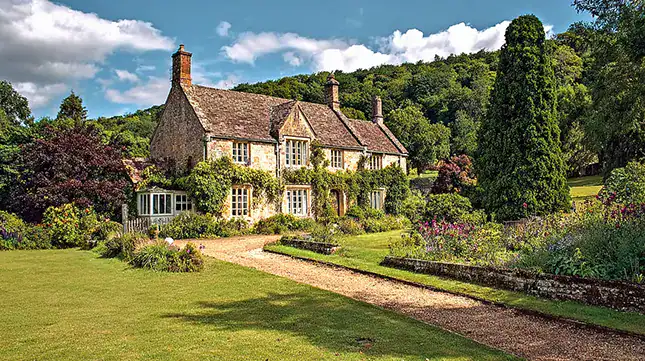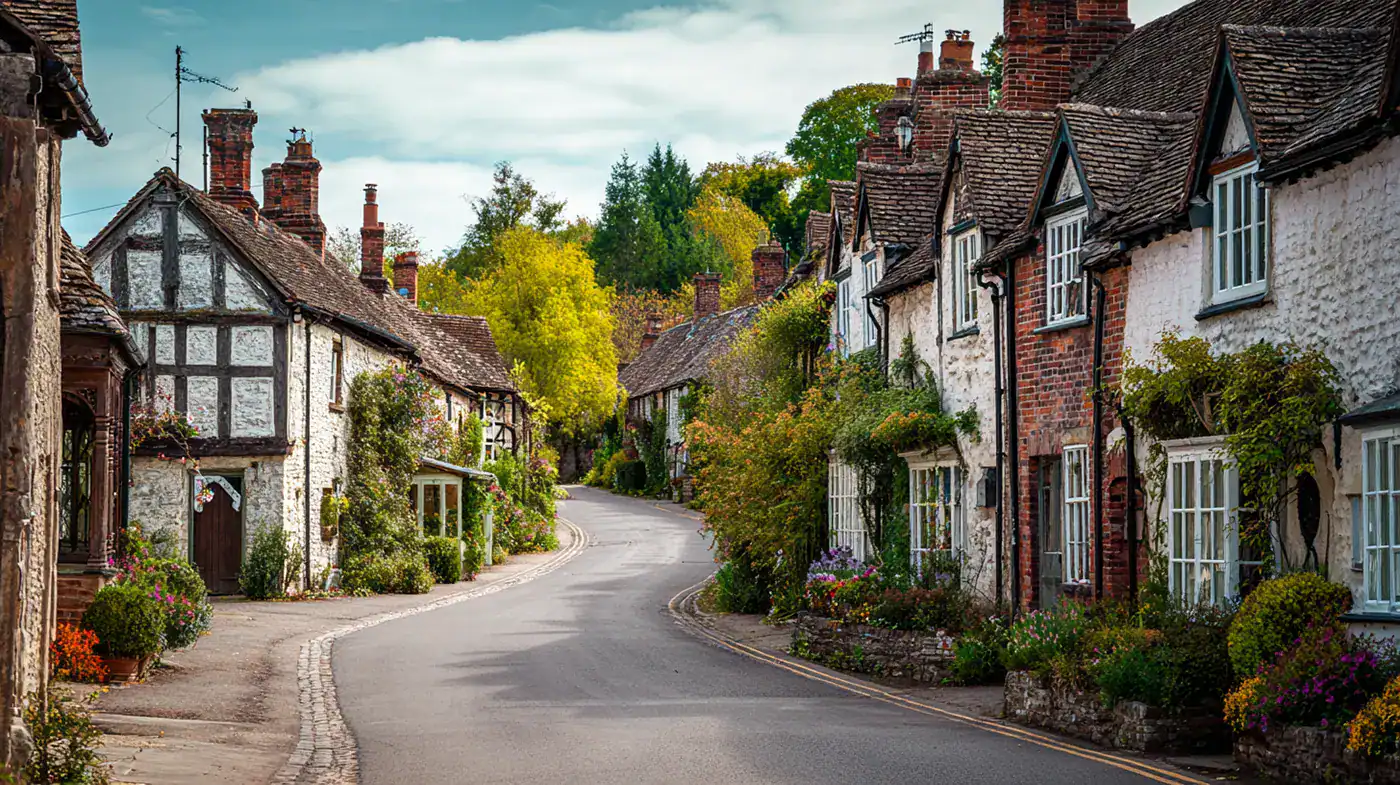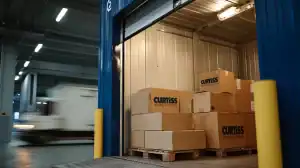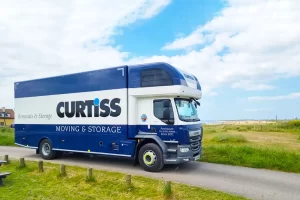Thinking of swapping city streets for rolling fields and village life?
The English countryside offers space, community, and a slower pace—without sacrificing modern comforts if you plan well.
This guide walks you through the real-world pros and cons, what to research, and the moving-day logistics that are unique to rural properties.
1) Why Consider Moving to the English Countryside?
There are plenty of reasons you may consider moving to the English countryside.
Here are some of the top reasons we could think of:
- More space for your money – larger gardens, outbuildings and room to grow.
- Nature on the doorstep – footpaths, cycle routes, dark skies and quieter roads.
- Community feel – village halls, clubs, fêtes and neighbours who know your name.
- Quality of life – less noise, lower stress, and a healthier work–life balance.
- Family friendly – green space for kids (and dogs) plus well-regarded rural schools nearby.
2) What to Research Before You Move

Do the groundwork now, and your transition will be effortless later.
Location & amenities to look out for:
- Distance to shops, GP/dentist, pharmacy, petrol station and a decent supermarket.
- School catchments and wraparound childcare availability.
- Emergency services response times and the nearest A&E.
Transport & access:
- Public transport frequency, last bus/train times, safe cycling routes.
- Road access to the property: width of lanes, passing places, steep gradients, and winter gritting.
- Where would a removal lorry park? Are there weight limits, height restrictions, bridges or fords?
Property services:
- Heating type (mains gas, oil, LPG, heat pump, solid fuel).
- Water & drainage: mains, borehole, private supply, septic tank or treatment plant (and compliance).
- Mobile signal & broadband speeds; FTTP or 5G availability; line-of-sight issues in valleys.
- Energy efficiency (EPC) and insulation—country homes can be draughty.
Planning & environment:
- Listed status, conservation area/AONB restrictions.
- Public rights of way/easements crossing the land.
- Flood risk, clay soil movement, and nearby agriculture (seasonal noise, smells, and early tractor runs).
Try before you buy:
If you’re moving far, consider a short-term rental or holiday let in the same village to test commute times, broadband, and the vibe across a typical week.
3) Jobs, Commuting & Connectivity

Having access to job opportunities and transport links is essential wherever you live.
Despite the slower pace of life, moving to the English countryside can still offer this:
- Remote/hybrid work: Verify upload speeds for video calls and determine whether a 4G/5G router or a Starlink-style solution would be beneficial.
- Commuting: Check realistic door-to-door times, parking at stations, season ticket options, and winter resilience.
- Local employment: Market towns often offer roles in healthcare, education, trades, tourism, and professional services.
4) Lifestyle Fit: Will you love it?

Making the move to the countryside offers buyers the chance to experience a slower pace of life.
If any of these sound appealing, you might love living in a more rural area:
- The nighttime economy is quieter—fewer late bars, more pub quizzes, and community events.
- Hobbies: walking groups, cricket clubs, riding stables, allotments and WI/men’s sheds.
- Families: look for parks, forest schools, Scout/Guide groups and weekend sports.
- Pets: check nearby vets and year-round access for dog walks (livestock rules apply).
5) Cost of living: Realities to Budget for

It’s always essential to keep in mind the cost of living, especially when moving to an entirely new area:
- Heating & energy: Oil/LPG can be pricier and is typically paid in bulk; older homes may require more expensive heating systems.
- Transport: likely higher fuel and maintenance spend; many rural households run two cars.
- Insurance: premiums can vary for thatched roofs, wood-burners or flood zones.
- Trades & deliveries: longer call-out times, occasional rural surcharges; book early for gardeners/roofers/chimney sweeps.
- Council Tax: Banding differs by property and parish—check before you make an offer.
6) Potential Drawbacks and How to Mitigate Them
Be realistic about your expectations when moving to a more rural area.
Like every decision, moving away from a town or city will have its drawbacks:
- Feeling isolated → Join local Facebook groups, parish newsletters, clubs and volunteering; schedule city days.
- Limited public transport → Build car sharing into your routine; plan “park-and-ride” commutes.
- Weather & access → Keep grit, torches and a winter kit; consider all-weather tyres; know alternate routes.
- Connectivity gaps → External antennas, mesh Wi-Fi, or satellite as a fallback.
- Wildlife & pests → Expect field mice and midges; budget for prevention and regular servicing of oil tanks/septic systems.
7) Country-Property Viewing Checklist

Take this list to viewings (it’s gold for second visits):
- Vehicular access suitable for a removal lorry (width, turning circle, overhanging trees).
- Driveway/track surface; soft ground or steep slopes that may need a shuttle on moving day.
- Mains vs. private water and drainage; age/condition of septic tank; access for emptying.
- Heating system age, fuel type, tank location and recent service history.
- EPC rating, loft/wall insulation, double glazing, draught points.
- Mobile signal indoors; actual broadband speed at the router.
- Outbuildings (power, damp, asbestos risk); restrictions if listed.
- Rights of way, boundary lines, gates and livestock responsibilities.
- Flooding or surface water; where does rain run off in a storm?
8) Moving-day logistics for Rural Homes
Country moves have quirks—this is where an experienced remover matters.
- Access survey: We map lane widths, tight bends, and low branches; if required, we use a shuttle vehicle to transport personnel from the road to the house.
- Parking & permissions: Agree with neighbours and/or farm owners in advance; mark spaces with cones the night before.
- Ground protection: trackway boards or ramps for soft verges; floor and door protection inside.
- Large/awkward items: ride-on mowers, AGAs, pianos, gym kit—book specialist handling early.
- Seasonal timing: Avoid using harvest machinery on lanes where possible; plan for increased school-holiday traffic.
- Contingency: weather buffers and a priority-unpack plan (beds, heating, kettle).
How Curtiss Moving & Storage Can Help

With decades of countryside relocations under our belt, we make rural moves straightforward:
- Free home or video survey at a time that suits you
- Professional packing (fragile-only or full pack), export wrapping and specialist item care
- Short- and long-term storage for bridging gaps between sale and completion
- Access solutions (shuttle vehicles, parking management, protective trackway)
- Dedicated move manager and fully insured crews
Get your free quote today: call 023 9298 5830 or complete a quick quote form—our friendly team will plan your countryside move to perfection.
FAQs
Is the countryside really cheaper than the city?
Property can be a better value, but factor in heating, transport and maintenance. Run a full monthly budget rather than relying on house prices alone.
Will I need two cars?
Not always, but many rural households keep two due to limited public transport. Check school runs and work schedules before making a decision.
Is the broadband good enough for remote work?
In many villages, yes—especially with FTTP or 5G. Always test speeds at the exact location and explore boosters or satellite as backup options.
Should I rent before buying?
If you’re moving far or changing lifestyle significantly, a six-month rental can de-risk your decision and refine your search area.
How far in advance should I book removals?
Six to eight weeks is sensible during busy periods. If you’re waiting on the exchange, we can pencil dates and firm up on completion.




